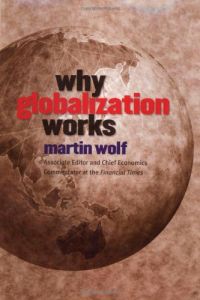Join getAbstract to access the summary!

Join getAbstract to access the summary!
Martin Wolf
Why Globalization Works
Yale UP, 2004
What's inside?
The problem isn't that the world's economies are too globalized. The problem is that they are not globalized enough.
Recommendation
In this purpose-driven book, author Martin Wolf stakes out his intellectual turf clearly and defends it. Wolf begins with the concept that the value of the individual and the importance of that individual’s right to pursue economic advancement are the foundation of the world’s great democracies. From there, he levels a devastating critique against the anti-globalists and the diverse interests that oppose the global integration of markets. He presents strong evidence that the power of international corporations has been exaggerated, and concludes that the issue isn’t too much globalization, but rather too little. This clear-eyed, well-researched defense of globalization should become a mainstay in any library of economic rationalism. getAbstract recommends it most highly.
Summary
About the Author
Martin Wolf is associate editor and chief commentator on economics for Financial Times. Wolf was educated at Oxford University. He is a visiting professor at Oxford’s Nuffield College and a special professor at the University of Nottingham. He has won numerous journalism awards, and was senior economist at the World Bank in the 1970s.




















Comment on this summary